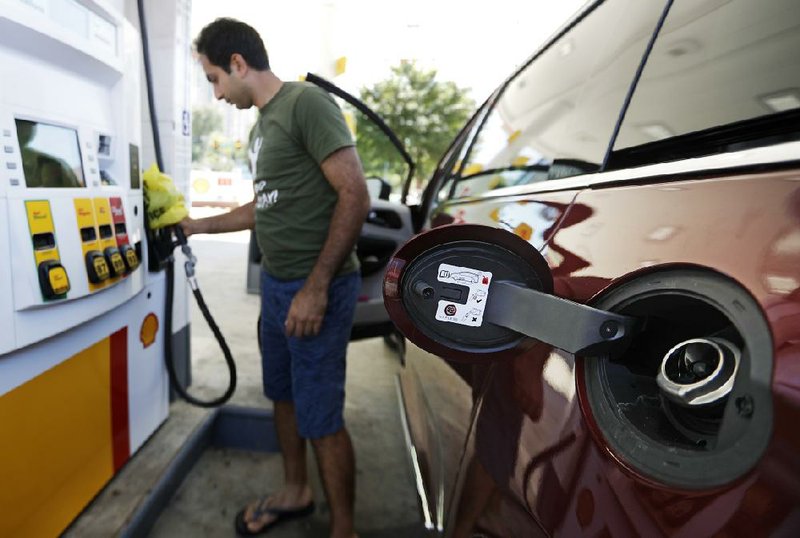Gasoline prices in some states are rising after a pipeline ruptured in Alabama more than a week ago and placed fuel supplies at risk.
Several states, including Georgia, Tennessee and North Carolina, have seen fuel prices jump between 9 cents and 25 cents per gallon in the past week after the leak of a gasoline pipeline on Sept. 9 cut off delivery to those areas.
Some governors have declared a state of emergency in an attempt to speed up the delivery of fuel to their states via truck, but during the weekend there were reports of gasoline shortages at fuel stations across the region.
While the price increases and fuel shortages have so far been limited to states supplied by the pipeline, analysts said Monday that the problems have the potential to seep into surrounding states, including Arkansas, as gasoline is diverted to areas in need.
"That pipeline is a major, major supplier to all of those states on the East Coast," said Mike Right, a spokesman for AAA.
"It's not having any noticeable impact other than on the states served by the pipeline," he said.
"That could change depending on the length of the outage because they are going to have to move product to that area somehow."
The pipeline leak in Alabama was noticed the morning of Sept. 9 by a mining employee who smelled an odor of petroleum products at a work site in Shelby County.
At least 252,000 gallons of gasoline spilled from the pipeline into a pond.
The 36-inch pipeline is owned by Colonial Pipeline Co. of Georgia and delivers gasoline from refineries in the Gulf Coast to much of the Southeast and Mid-Atlantic.
The pipeline runs from Houston to Greensboro, N.C. The section that leaked was installed in 1963.
Other states that have been hit by the pipeline rupture include South Carolina and Virginia.
The federal Pipeline and Hazardous Materials Safety Administration issued a "Corrective Action Order" on Friday that says Colonial Pipeline cannot restart the pipeline without the agency's approval.
The company is working on constructing a bypass line that would allow it to resume shipments on the pipeline.
Colonial Pipeline did not return a phone call seeking comment.
The company said on its website that it has collected gasoline from Gulf Coast refiners to deliver to terminals in affected markets.
"We continue to be in regular communication with our customers, who are also working on their own individual contingency plans to minimize supply disruptions," the company posted on its website.
"This includes trucking and barging fuel from other markets and refineries."
Some analysts said gasoline supply disruptions in those states hit hardest could last another week -- at least.
"Most veteran suppliers and distributors believe that 'the worst is yet to come' for southeastern supply, noting that little fuel will arrive in the next 10 days and 'rolling outages' will worsen," said Tom Kloza, chief oil analyst for gasbuddy.com, in a research note.
He added "...each additional station that runs out of fuel tends to provoke panic behavior from consumers, topping their tanks."
In response to the fuel shortages, several governors have issued executive orders to make it easier for gasoline to be transported through their state.
Gov. Pat McCrory of North Carolina signed an order last week to temporarily waive hours of service restrictions for fuel vehicles, and another to prevent significant price increases at fuel stations. Georgia Gov. Nathan Deal also signed an executive order forbidding price-gouging Monday.
Motorists in the six states served by the Colonial pipeline have seen a spike in gasoline prices in the past week as a result of tightened supplies.
In Georgia, pump prices have jumped 25 cents to average $2.36 a gallon on Monday. Tennessee gasoline prices have increased 15 cents to average $2.14 a gallon, according to gasbuddy.com.
Prices of a gallon of gas have increased 14.4 cents in North Carolina; 16.3 cents in South Carolina; 9 cents in Alabama; and 7.7 cents in Virginia.
Analysts said gasoline prices could rise slightly in other states because companies will be redirecting gasoline supply to affected area.
For example, some fuel that would normally go to Mississippi might be shipped to Alabama.
Or gasoline stored in terminals in eastern Arkansas could go to Tennessee, said Kloza in an email.
In Arkansas, gasoline averaged $1.98 a gallon on Monday, down 2.2 cents from a week ago, according to gasbuddy.com
"They would probably be drawing [gasoline] from a number of states," added Right, with AAA.
"Gasoline is such an absolute commodity these days," he said. "You can't run a business ... a region without gasoline. Basic services will suffer eventually."
Business on 09/20/2016


